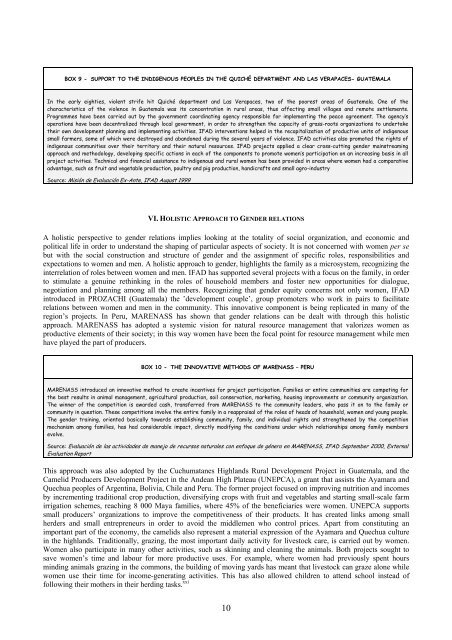Enhancing the Role of Indigenous Women in Sustainable ...
Enhancing the Role of Indigenous Women in Sustainable ...
Enhancing the Role of Indigenous Women in Sustainable ...
Create successful ePaper yourself
Turn your PDF publications into a flip-book with our unique Google optimized e-Paper software.
BOX 9 - SUPPORT TO THE INDIGENOUS PEOPLES IN THE QUICHÉ DEPARTMENT AND LAS VERAPACES- GUATEMALA<br />
In <strong>the</strong> early eighties, violent strife hit Quiché department and Las Verapaces, two <strong>of</strong> <strong>the</strong> poorest areas <strong>of</strong> Guatemala. One <strong>of</strong> <strong>the</strong><br />
characteristics <strong>of</strong> <strong>the</strong> violence <strong>in</strong> Guatemala was its concentration <strong>in</strong> rural areas, thus affect<strong>in</strong>g small villages and remote settlements.<br />
Programmes have been carried out by <strong>the</strong> government coord<strong>in</strong>at<strong>in</strong>g agency responsible for implement<strong>in</strong>g <strong>the</strong> peace agreement. The agency’s<br />
operations have been decentralized through local government, <strong>in</strong> order to streng<strong>the</strong>n <strong>the</strong> capacity <strong>of</strong> grass-roots organizations to undertake<br />
<strong>the</strong>ir own development plann<strong>in</strong>g and implement<strong>in</strong>g activities. IFAD <strong>in</strong>terventions helped <strong>in</strong> <strong>the</strong> recapitalization <strong>of</strong> productive units <strong>of</strong> <strong>in</strong>digenous<br />
small farmers, some <strong>of</strong> which were destroyed and abandoned dur<strong>in</strong>g <strong>the</strong> several years <strong>of</strong> violence. IFAD activities also promoted <strong>the</strong> rights <strong>of</strong><br />
<strong>in</strong>digenous communities over <strong>the</strong>ir territory and <strong>the</strong>ir natural resources. IFAD projects applied a clear cross-cutt<strong>in</strong>g gender ma<strong>in</strong>stream<strong>in</strong>g<br />
approach and methodology, develop<strong>in</strong>g specific actions <strong>in</strong> each <strong>of</strong> <strong>the</strong> components to promote women’s participation on an <strong>in</strong>creas<strong>in</strong>g basis <strong>in</strong> all<br />
project activities. Technical and f<strong>in</strong>ancial assistance to <strong>in</strong>digenous and rural women has been provided <strong>in</strong> areas where women had a comparative<br />
advantage, such as fruit and vegetable production, poultry and pig production, handicrafts and small agro-<strong>in</strong>dustry<br />
Source: Misión de Evaluación Ex-Ante , IFAD August 1999<br />
VI. HOLISTIC APPROACH TO GENDER RELATIONS<br />
A holistic perspective to gender relations implies look<strong>in</strong>g at <strong>the</strong> totality <strong>of</strong> social organization, and economic and<br />
political life <strong>in</strong> order to understand <strong>the</strong> shap<strong>in</strong>g <strong>of</strong> particular aspects <strong>of</strong> society. It is not concerned with women per se<br />
but with <strong>the</strong> social construction and structure <strong>of</strong> gender and <strong>the</strong> assignment <strong>of</strong> specific roles, responsibilities and<br />
expectations to women and men. A holistic approach to gender, highlights <strong>the</strong> family as a microsystem, recogniz<strong>in</strong>g <strong>the</strong><br />
<strong>in</strong>terrelation <strong>of</strong> roles between women and men. IFAD has supported several projects with a focus on <strong>the</strong> family, <strong>in</strong> order<br />
to stimulate a genu<strong>in</strong>e reth<strong>in</strong>k<strong>in</strong>g <strong>in</strong> <strong>the</strong> roles <strong>of</strong> household members and foster new opportunities for dialogue,<br />
negotiation and plann<strong>in</strong>g among all <strong>the</strong> members. Recogniz<strong>in</strong>g that gender equity concerns not only women, IFAD<br />
<strong>in</strong>troduced <strong>in</strong> PROZACHI (Guatemala) <strong>the</strong> ‛development couple’, group promoters who work <strong>in</strong> pairs to facilitate<br />
relations between women and men <strong>in</strong> <strong>the</strong> community. This <strong>in</strong>novative component is be<strong>in</strong>g replicated <strong>in</strong> many <strong>of</strong> <strong>the</strong><br />
region’s projects. In Peru, MARENASS has shown that gender relations can be dealt with through this holistic<br />
approach. MARENASS has adopted a systemic vision for natural resource management that valorizes women as<br />
productive elements <strong>of</strong> <strong>the</strong>ir society; <strong>in</strong> this way women have been <strong>the</strong> focal po<strong>in</strong>t for resource management while men<br />
have played <strong>the</strong> part <strong>of</strong> producers.<br />
BOX 10 - THE INNOVATIVE METHODS OF MARENASS – PERU<br />
MARENASS <strong>in</strong>troduced an <strong>in</strong>novative method to create <strong>in</strong>centives for project participation. Families or entire communities are compet<strong>in</strong>g for<br />
<strong>the</strong> best results <strong>in</strong> animal management, agricultural production, soil conservation, market<strong>in</strong>g, hous<strong>in</strong>g improvements or community organization.<br />
The w<strong>in</strong>ner <strong>of</strong> <strong>the</strong> competition is awarded cash, transferred from MARENASS to <strong>the</strong> community leaders, who pass it on to <strong>the</strong> family or<br />
community <strong>in</strong> question. These competitions <strong>in</strong>volve <strong>the</strong> entire family <strong>in</strong> a reappraisal <strong>of</strong> <strong>the</strong> roles <strong>of</strong> heads <strong>of</strong> household, women and young people.<br />
The gender tra<strong>in</strong><strong>in</strong>g, oriented basically towards establish<strong>in</strong>g community, family, and <strong>in</strong>dividual rights and streng<strong>the</strong>ned by <strong>the</strong> competition<br />
mechanism among families, has had considerable impact, directly modify<strong>in</strong>g <strong>the</strong> conditions under which relationships among family members<br />
evolve.<br />
Source: Evaluación de las actividades de manejo de recursos naturales con enfoque de género en MARENASS, IFAD September 2000, External<br />
Evaluation Report<br />
This approach was also adopted by <strong>the</strong> Cuchumatanes Highlands Rural Development Project <strong>in</strong> Guatemala, and <strong>the</strong><br />
Camelid Producers Development Project <strong>in</strong> <strong>the</strong> Andean High Plateau (UNEPCA), a grant that assists <strong>the</strong> Ayamara and<br />
Quechua peoples <strong>of</strong> Argent<strong>in</strong>a, Bolivia, Chile and Peru. The former project focused on improv<strong>in</strong>g nutrition and <strong>in</strong>comes<br />
by <strong>in</strong>crement<strong>in</strong>g traditional crop production, diversify<strong>in</strong>g crops with fruit and vegetables and start<strong>in</strong>g small-scale farm<br />
irrigation schemes, reach<strong>in</strong>g 8 000 Maya families, where 45% <strong>of</strong> <strong>the</strong> beneficiaries were women. UNEPCA supports<br />
small producers’ organizations to improve <strong>the</strong> competitiveness <strong>of</strong> <strong>the</strong>ir products. It has created l<strong>in</strong>ks among small<br />
herders and small entrepreneurs <strong>in</strong> order to avoid <strong>the</strong> middlemen who control prices. Apart from constitut<strong>in</strong>g an<br />
important part <strong>of</strong> <strong>the</strong> economy, <strong>the</strong> camelids also represent a material expression <strong>of</strong> <strong>the</strong> Ayamara and Quechua culture<br />
<strong>in</strong> <strong>the</strong> highlands. Traditionally, graz<strong>in</strong>g, <strong>the</strong> most important daily activity for livestock care, is carried out by women.<br />
<strong>Women</strong> also participate <strong>in</strong> many o<strong>the</strong>r activities, such as sk<strong>in</strong>n<strong>in</strong>g and clean<strong>in</strong>g <strong>the</strong> animals. Both projects sought to<br />
save women’s time and labour for more productive uses. For example, where women had previously spent hours<br />
m<strong>in</strong>d<strong>in</strong>g animals graz<strong>in</strong>g <strong>in</strong> <strong>the</strong> commons, <strong>the</strong> build<strong>in</strong>g <strong>of</strong> mov<strong>in</strong>g yards has meant that livestock can graze alone while<br />
women use <strong>the</strong>ir time for <strong>in</strong>come-generat<strong>in</strong>g activities. This has also allowed children to attend school <strong>in</strong>stead <strong>of</strong><br />
follow<strong>in</strong>g <strong>the</strong>ir mo<strong>the</strong>rs <strong>in</strong> <strong>the</strong>ir herd<strong>in</strong>g tasks. xxi<br />
10

















